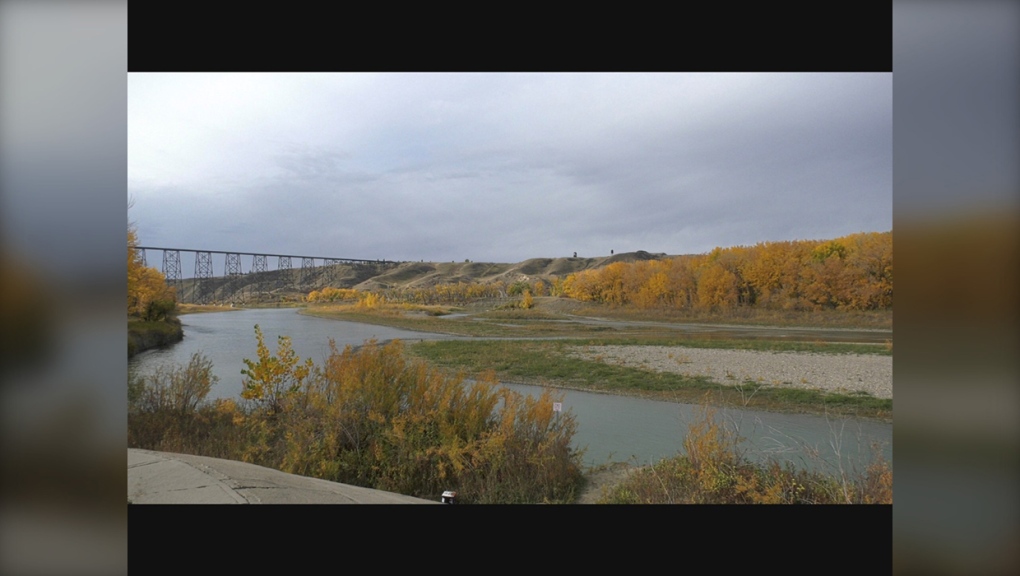Above-average snowpack needed to bring water levels in southern Alberta back to normal
 While most crops are out of the ground, irrigation districts are reflecting on the possibility of another drought-like summer.
While most crops are out of the ground, irrigation districts are reflecting on the possibility of another drought-like summer.
Water continues to be a hot commodity in southern Alberta as the seasons change.
“This was the sixth driest year on record in southern Alberta in the past 99 years, according to Alberta Agriculture and Irrigation,” said David Westwood, general manager of the St. Mary’s Irrigation District (SMRID).
While most crops are out of the ground, irrigation districts are reflecting on the possibility of another summer with drought-like conditions.
Canada’s largest irrigation district – the SMRID -- imposed a 15-inch per-acre allocation as a result of a low snow pack and precipitation this spring.
“As we saw the snowpack melt off extremely early - much earlier than normal - and the heat we had and the drought-like conditions we recognized that that forecast was not going to come to fruition and so we had to, unfortunately, reduce allocation two times,” Westwood explained.
Water levels in the Oldman Reservoir continue to be below average, according to the city.
In August, the city implemented a voluntary water conservation for residents as a way to ease the pressure on the river, while municipalities like the Town of Pincher Creek imposed water restrictions.
“The big concern right now is the starting point and the levels we’re at right now are quite low,” said Doug Kaupp, general manager of water and wastewater with the City of Lethbridge.
WORST IN 50 YEARS
He said the water situation hasn't looked this bad in the past 50 years.
“There is possibility of us needing to restrict our water use even in the winter time which is really hard to do compared to in the summer where we ask you to ease off on watering your lawn,” Kaupp said.
With below average snowpack in the Rockies and low precipitation over the past few years, experts said it'll take more than an average snowfall to bring water levels back to normal.
“Because of our warming climate, we have had many heat waves,"said Stefan Kienzle, an emeritus of hydrology professor at the University of Lethbridge’s department of geography and environment.
"And these heat waves result in very strong evaporation rates that suck the moisture out of the soil and aggravate the whole situation."
“So, even if we have a normal snow pack this winter" he added, "and we fill the reservoirs, we still have to anticipate that the evaporation rates remain high next year.”
MULTI-BILLION DOLLAR AGRICULTURE INDUSTRY
The SMRID provides water to 504,000 acres of land supporting southern Alberta’s multi-billion dollar agriculture industry.
With winter ahead, Westwood said there are some concerns heading into next year, but it'll all depend on when the snow starts to fall.
“We need an above-average snowpack and some good precipitation events to be able to bring our systems and store levels both in the SMRID and Alberta Agriculture and Irrigation Headworks Reservoirs back to more of an average level,” he said.
CTVNews.ca Top Stories

Teenage phenom Gavin McKenna scores, Canada tops Finland 4-0 in world junior opener
Teenage sensation Gavin McKenna scored late in the first period and Carter George made 31 saves for the shutout as Canada picked up a 4-0 victory over Finland in the host country's opener at the world junior hockey championship Thursday.
Ministers Joly, LeBlanc travel to Florida to meet with Trump's team
Two members of Prime Minister Justin Trudeau's cabinet will be in Palm Beach, Fla., Friday to meet with members of Donald Trump's team.
Hwy. 401 off-ramp shut down due to Boxing Day deal-hunters now reopen
A Highway 401 off-ramp west of Toronto that became so clogged up with Boxing Day deal-hunters Thursday that police had to shut it down out of safety concerns has re-opened.
India alleges widespread trafficking of international students through Canada to U.S.
Indian law enforcement agencies say they are investigating alleged links between dozens of colleges in Canada and two 'entities' in Mumbai accused of illegally ferrying students across the Canada-United States border.
Teen actor Hudson Meek, who appeared in 'Baby Driver,' dies after falling from moving vehicle
Hudson Meek, the 16-year-old actor who appeared in 'Baby Driver,' died last week after falling from a moving vehicle in Vestavia Hills, Alabama, according to CNN affiliate WVTM.
B.C woman awarded nearly $750K in court case against contractor
A B.C. woman has been awarded nearly $750,000 in damages in a dispute with a contractor who strung her along for a year and a half and failed to complete a renovation, according to a recent court decision.
Florida pizza deliverer charged with stabbing pregnant woman after tip dispute
A pizza deliverer in central Florida has been charged with pushing her way into a motel room with an accomplice and stabbing a pregnant woman after a dispute over a tip, authorities said.
2 minors, 2 adults critically injured in south Calgary crash; incident was preceded by a robbery
Multiple people were rushed to hospital, including two minors, in the aftermath of a serious vehicle collision on Thursday morning.
Christmas Eve stowaway caught on Delta airplane at Seattle airport
A stowaway was caught trying to nab a ride on a Delta Air Lines plane at Seattle-Tacoma International Airport on Christmas Eve.
































